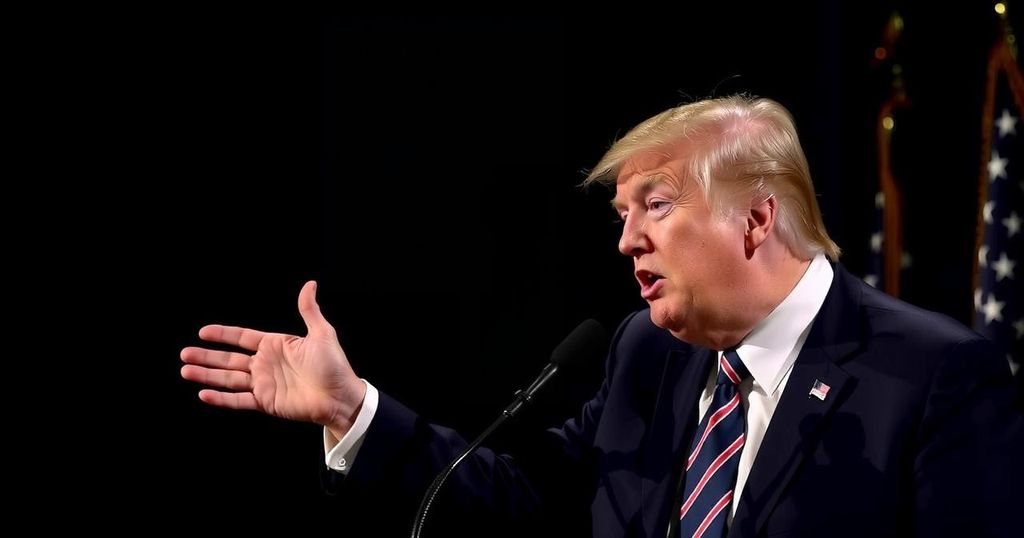Donald Trump Labels U.S. a ‘Third World Nation’ Amidst Election Allegations and Legal Challenges
Donald Trump has labeled the U.S. as a “third world nation” over alleged election shortcomings, asserting he is closely monitoring the 2024 election amid unproven claims of election fraud from 2020. His recent posts on Truth Social underscore frustrations with legal rulings related to voter registration and highlight his strategies to combat perceived misconduct ahead of the upcoming election. Early voting indicates a varied party turnout, complicating predictions about election outcomes.
Former President Donald Trump has characterized the United States as a “third world nation,” voicing his discontent regarding what he considers pervasive election “skullduggery.” In a post on Truth Social, Trump stated, “I, together with many Attorneys and Legal Scholars, am watching the Sanctity of the 2024 Presidential Election very closely because I know, better than most, the rampant Cheating and Skullduggery that has taken place by the Democrats in the 2020 Presidential Election.” He labeled the past election as a disgrace to the nation and emphasized the need for scrutiny as the 2024 election progresses. Despite Trump’s assertions, there has been no credible evidence supporting claims of election interference by the Democrats in the 2020 election. Trump is currently facing multiple legal challenges, including accusations related to election interference and the exertion of pressure on officials to alter the election results in his favor. He has consistently professed that these legal issues are a result of a political witch hunt. In his statements, Trump further elaborated on the consequences for those he deems to have cheated, asserting that they would face severe penalties, stating, “WHEN I WIN, those people that CHEATED will be prosecuted to the fullest extent of the Law, which will include long term prison sentences so that this Depravity of Justice does not happen again.” He expressed determination to prevent the country from descending into a state comparable to a third world nation. Trump also criticized U.S. District Judge Patricia Tolliver Giles, who halted Virginia’s initiative to purge voter rolls of potential noncitizens, calling the ruling “totally unacceptable.” Trump suggested that there was a need for vigilance regarding illegal voting and presented his support for the appeal by Virginia’s Governor Glenn Youngkin against this ruling. Following these concerns, data shows a notable trend in early voting ahead of the November election. The voting records indicate that more registered Democrats have voted early, though there were surprising early turnout rates for Republicans in critical swing states such as Nevada and Arizona. While Trump has expressed skepticism regarding early voting, he nonetheless encouraged his supporters to participate in it. The implications of these early voting trends may become clearer as more voters cast their ballots. In summary, Trump’s commentary on the electoral process underscores his ongoing grievances regarding the 2020 election while also strategizing for the forthcoming 2024 election, amidst legal controversies several of his claims remain unverified.
The discourse surrounding election integrity in the United States, particularly in the wake of the 2020 Presidential Election, has been a contentious issue, with former President Donald Trump continuously asserting claims of widespread electoral fraud. His recent remarks linking the present election framework to that of a “third world nation” highlights a narrative he has adopted to rally support against perceived injustices. Trump’s ongoing legal battles related to election interference only serve to amplify the urgency of his rhetoric as he campaigns for the 2024 election cycle. Additionally, political analyses of early voting trends reveal complex dynamics between parties, shedding light on voter behavior leading up to the election.
In conclusion, Donald Trump’s branding of the United States as a “third world nation” reflects his assertion of a compromised electoral system following the 2020 election. His legal predicaments coupled with his continued push against purported electoral violations set the stage for a contentious 2024 electoral process. As early voting trends unfold, a clearer picture of electoral engagement will emerge, further shaping the ongoing dialogue about integrity and participation in the democratic process.
Original Source: www.newsweek.com




Post Comment